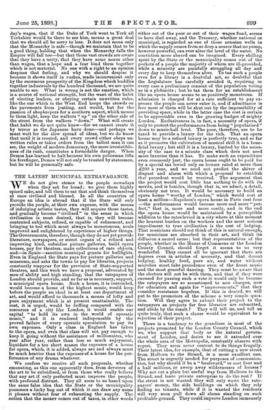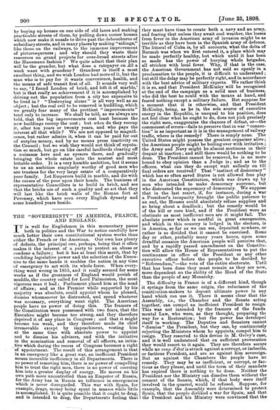THE LATEST Ml7NICIPAL EXTRAVAGANCE.
WE do not give stones to the people nowadays when they ask for bread ; we give them highly spiced. cake, and tell them to eat that and think themselves at once civilised and blessed. In all the countries of Europe an idea is abroad that if the State will only provide the people, at their own expense, with the means of indulging artistic tastes, they will acquire those tastes, and gradually become "civilised" in the sense in which civilisation is most desired, that is, they will become contented subjects, refined, or capable of refinement, and bringing to toil which must always be monotonous, souls improved and enlightened by experience of higher things. The Governments, therefore, though they do not yet provide literature, newspapers, or street organs of a refined and improving kind, subsidise picture galleries, build opera houses, pay for theatres, make collections of rare objects, and—in Spain—sanction municipal grants for bullfights. Even in England the State pays for picture galleries and museums, and asks the towns to pay for libraries, projects constantly reappear for the provision of State-supported theatres, and this week we have a proposal, advocated by men of ability and high standing, that the ratepayers of London should provide, and so far as is necessary, support, a municipal opera house. Such a house, it is contended, would become a home of the highest music, would. keep before the people an ideal in at least one department of art, and would afford to thousands a means of lofty and pure enjoyment which is at present unattainable. The cost, it is urged, would be trifling compared with the resources of a city like London, it would enable our capital "to hold its own in the world of operatic music," and it is rendered indispensable by the proved failure of every operatic speculation to pay its own expenses. Only a class in England. has taken to the opera, and even that class will not pay enough to keep it going without the assistance of millionaires, who year after year, rather than lose so much enjoyment, liquidate for a too short season the expenses of a house for opera, which, it is added, always are and always must be much heavier than the expenses of a house for the per- formance of any drama whatever.
We confess we receive all such proposals, whether emanating, as this one apparently does, from devotees of the art to be subsidised, or from those who really believe that any art if only perfected must improve the people, with profound distrust. They all seem to us based upon the same false idea that the State or the municipality possesses a lucky bag out of which it can draw any sums it pleases without fear of exhausting the supply. The notion that the money comes out of taxes, in other words either out of the poor or out of their wages fund, seems to have died away, and the Treasury, whether national on municipal, is regarded as one of those artesian wells in which the supply comes from so deep a source that no pump, however powerful, can ever alter the level of the water. No conviction more absurd can be imagined. Every shilling spent by the State or the municipality comes out of the pockets of a people the majority of whom are ill-provided, while a minority are painfully struggling all day and every day to keep themselves alive. To tax such a people even for a library is a, doubtful act, so doubtful that the Legislature has carefully avoided it, requiring in every case a preliminary consent of the population voting as in a plebiscite ; but to tax them for an establishment like an opera house seems to us positively monstrous. If admission is charged for at a rate sufficient to pay ex- penses the people can never enter it, and if admittance is free most of them will be shut out by the impossibility of providing space, while in the latter case the cost is certain to be appreciable even in the growing budget of mighty London. Exclusiveness is, in fact, a necessity of opera, if only to protect the performances from being " popularised" down to music-hall level. The poor, therefore, are to be taxed to provide a luxury for the rich. That an opera house may be a refined luxury is perfectly true, and so far as it promotes the cultivation of musical skill it is a bene- ficial luxury ; but still it is a luxury, limited by the neces- sity of the case to a minute class which does not need more luxuries than it has. To make such an expenditure even commonly just, the opera house ought to be paid for by a special tax levied only on houses rated at more than £200 a year, and we need not predict the shiver of disgust and alarm with which a proposal to establish that precedent would be received. The argument that the project would cost little has nothing to do with its merits, and is besides, though that is, we admit, a detail, obviously not true. It would be necessary to build an opera house " worthy of London," which would cost at least a million—Napoleon's opera house in Paris cost four —the performances would become more and more "per- fect," that is, more and more costly, and in the end the opera house would be maintained by a perceptible addition to the rates levied. in a city where at this moment the heaviest burden on the workers and the most serious impediment to true civilisation is the cost of lodging. That musicians should not think of this is natural enough, for musicians are absorbed. in their art, and think its diffusion a sacred cause ; but that representatives of the people, whether in the House of Commons or the London County Council, should forget it seems to us very wonderful. They cannot all be ignorant that there are degrees even in articles of necessity, and that decent lodging, healthy food, pure air, and water without microbes must take precedence even of the finest music and the most graceful dancing. They must be aware that the electors will not be with them, and that if they were excused for passing such a vote it would. only be because the ratepayers are so accustomed to new charges, now for education and again for " improvements," that they consider resistance hopeless. If this is denied, we will put to the promoters of the scheme a very simple ques, tion. Will they agree to submit their project to the ratepayers as projects for free libraries are submitted, and abide by the result ? They will tell us, and tell us quite truly, that such a clause would be equivalent to a rejection of their project.
There is a tendency to the grandiose in most of the projects promoted by the London County Council, which we, who support that body as the natural govern- ment of London, and desire to see it extended over the whole area of the Metropolis, constantly observe with regret. They seem never content to do things frugally. Their latest idea, for example, that of cutting a new street from Holborn to the Strand, is a most excellent one. The street is urgently needed. for purposes of communica- tion, but why should it be a " boulevard," or cost four and a half millions, or sweep away wildernesses of houses ? Why not cut a plain but useful way from Holborn to the Strand, and leave private enterprise to do the rest ? If the street is not wanted they will only waste the rate- payers' money, the side buildings on which they rely finding no tenants, while if it is wanted the residents will very soon pull down all slums standing on such profitable ground. They could improve London immensely by buying up houses on one side of old lanes and making practicable streets of them, by pulling down corner houses which now make it unsafe to drive past the debouchures of subsidiary streets, and in many places by making "sidings," like those on the railways, to the immense improvement of picturesqueness ; and why should they waste their resources on grand projects for over-broad streets after the Hausmann fashion ? We quite admit that their plan will be the grander, but what does a ratepayer on £3 a week want with grandeur ? Grandeur is itself a most excellent thing, and we wish London had more of it, but the man who is to pay for it wants convenience, health, and the means of safe transit first of all. It sounds very well to say, ' I found London of brick, and left it of marble,' but is that really an achievement if it is accomplished by driving out the population from a city too expensive to be lived in ? "Destroying slums " is all very well as an object ; but the real evil to be removed is huddling, which we greatly fear many of the prettiest " improvements " tend only to increase. We shall be told, as we always are told, that the big improvements cost least because the new buildings recoup the cost ; but when do they recoup it, after ten years or twenty years, and who pays the interest all that while ? We are not opposed to magnifi- cence, but rather admire it, when it can be paid for out of surplus money, and by no means press inactivity on the Council ; but we wish they would not think of reputa- tion so much, but go on like careful landlords clearing off a nuisance here and an eyesore there, and gradually bringing the whole estate into the neatest and most lettable order. It is a very humble ambition, but it seems to us an ambition singularly worthy of good men who are trustees for the very large estate of a comparatively poor family. Let Emperors build in marble, and die with the curses of the poor upon their heads. The business of representative Councillors is to build in brick, and see that the bricks are of such a quality and so set that they will last like the brick walls of the Roman fort at Pevensey, which have seen every English dynasty and some hundred years beside.



















































 Previous page
Previous page